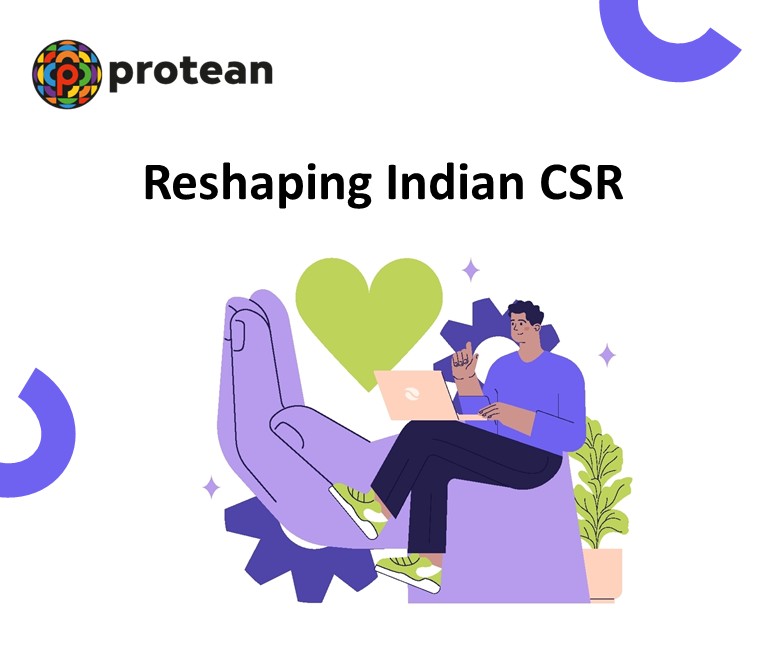India’s corporate social responsibility (CSR) landscape has undergone a significant transformation since the mandate of the Companies Act, 2013. According to National CSR portal, it's encouraging to see that the Indian Corporates put a substantial ₹26,579 crore towards various social causes, with around 19,888 orporates are mandated to do CSR. Interestingly, a large chunk of these funds, almost 25%, went to Maharashtra, Odisha, and Delhi.
However, this positive picture has a flip side. Despite the increasing amounts being spent, there are valid questions about whether these efforts are truly making the biggest difference. Intriguingly, in FY23, a significant 4,855 companies were reported to have defaulted on their CSR expenditure. This raises an important paradox: with so much potential for good, is there a more intelligent and smarter way for companies to manage their CSR and ensure it leads to real, meaningful change?
Thematic Focus – Gaps in the Current CSR Ecosystem
While the target for CSR in India is commendable, refining its existing frameworks will unlock even greater effectiveness and broader societal benefit. One significant hurdle lies in discovery gaps. Corporates often face considerable difficulty in identifying the right non-governmental organizations (NGOs) and projects partners that align precisely with their thematic focus and desired geographic reach. This can lead to inefficient partnerships and a mismatch between corporate objectives and on-the-ground needs.
Furthermore, the compliance overload associated with CSR can be a significant drain on resources. The complexities of monitoring, reporting, 80G certificate issuance, and the CSR Form-1 filings can overwhelm CSR teams, potentially diverting attention from strategic impact-driven activities.
Another critical issue is the duplication of efforts. The absence of a centralized, easily accessible repository of CSR initiatives and partner information often results in multiple corporates and NGOs working on similar projects in the same regions, leading to lack of centralized documentation and partner visibility.
Perhaps the most pressing challenge is impact uncertainty. Despite the substantial financial investments made, the ability to consistently and accurately measure outcomes of CSR initiatives remains a significant concern. The average CSR spend, at 1.91% in FY23, still hovers slightly below the mandated 2%, and the staggering ₹1,475 crore in unspent CSR funds in the same year – the highest in the last five years.
The crucial question remains: how can we move beyond mere expenditure to ensure that CSR activities translate into demonstrable and sustainable positive change?
The Role of Technology in Solving Systemic CSR Challenges
Technology holds immense potential to revolutionize the way CSR is conceived, implemented, and evaluated in India, offering viable solutions to the systemic challenges outlined above. Smart discovery tools can significantly streamline the process of identifying suitable NGO and project partners. Corporates can filter potential collaborations based on thematic alignment, geographic focus and Sustainable Development Goal (SDG) alignment, ensuring a more strategic and impactful selection process.
Transparent monitoring systems, leveraging real-time tracking capabilities, automated alerts, and unique project identifiers, can bring unusual levels of accountability and efficiency to project oversight.
Furthermore, technology can play a vital role in automating compliance by instantly generating compliance certificates like 80G and 10BD, along with facilitating digital audits and ensuring adherence to regulatory requirements.
The emergence of centralized collaboration hubs represents an ideal shift in the CSR ecosystem. These shared digital environments can bring together diverse stakeholders – corporates, NGOs, CSR consulting firms, and certifiers – onto a single platform.
Emergence of Holistic Platforms – A Case Insight (Protean Life)
Within this evolving technological landscape, initiatives like Protean Life are gaining significant traction. This platform exemplifies the shift towards a more integrated and impactful approach to CSR management. Protean Life enables projects and entity discovery that align with their specific SDGs and geographic priorities, ensuring a more strategic allocation of resources.
Know more about Protean Life |
Beyond discovery, the platform offers document management capabilities, facilitates automated fund routing, and provides compliance tools. Importantly, by supporting collaboration among various stakeholders, including NGOs, corporate CSR teams, and consulting partners, Protean Life has become a notable winner of the prestigious Golden Peacock Award, fostering a more unified and transparent ecosystem. Platforms like these signify a crucial move away from piecemeal execution towards a system-wide approach, effectively bridging the gap between corporate intent with measurable impact.
Conclusion
Corporate Social Responsibility in India, driven by a strong regulatory framework and a growing sense of corporate citizenship, holds immense potential to be a powerful catalyst for systemic change. It is crucial to encourage corporate leaders and CSR consultants to consider how technology can be strategically integrated into their CSR strategies chart their future strategies, with a critical lens of technology-driven collaboration. In a nation where projections indicate a potential annual CSR spend of ₹1.2 lakh crore by 2034, the fundamental question is not about the money, but rather whether we have the tools to ensure that these substantial resources are deployed wisely, creating lasting and meaningful impact on the lives and livelihoods of communities across India.

